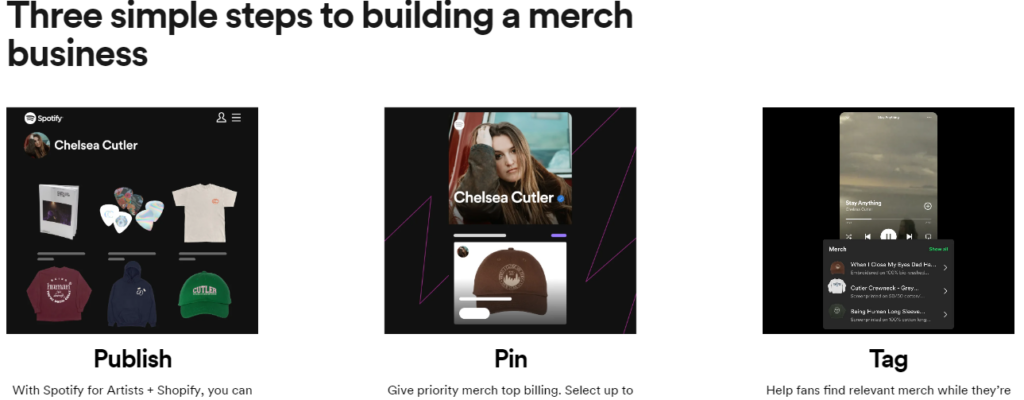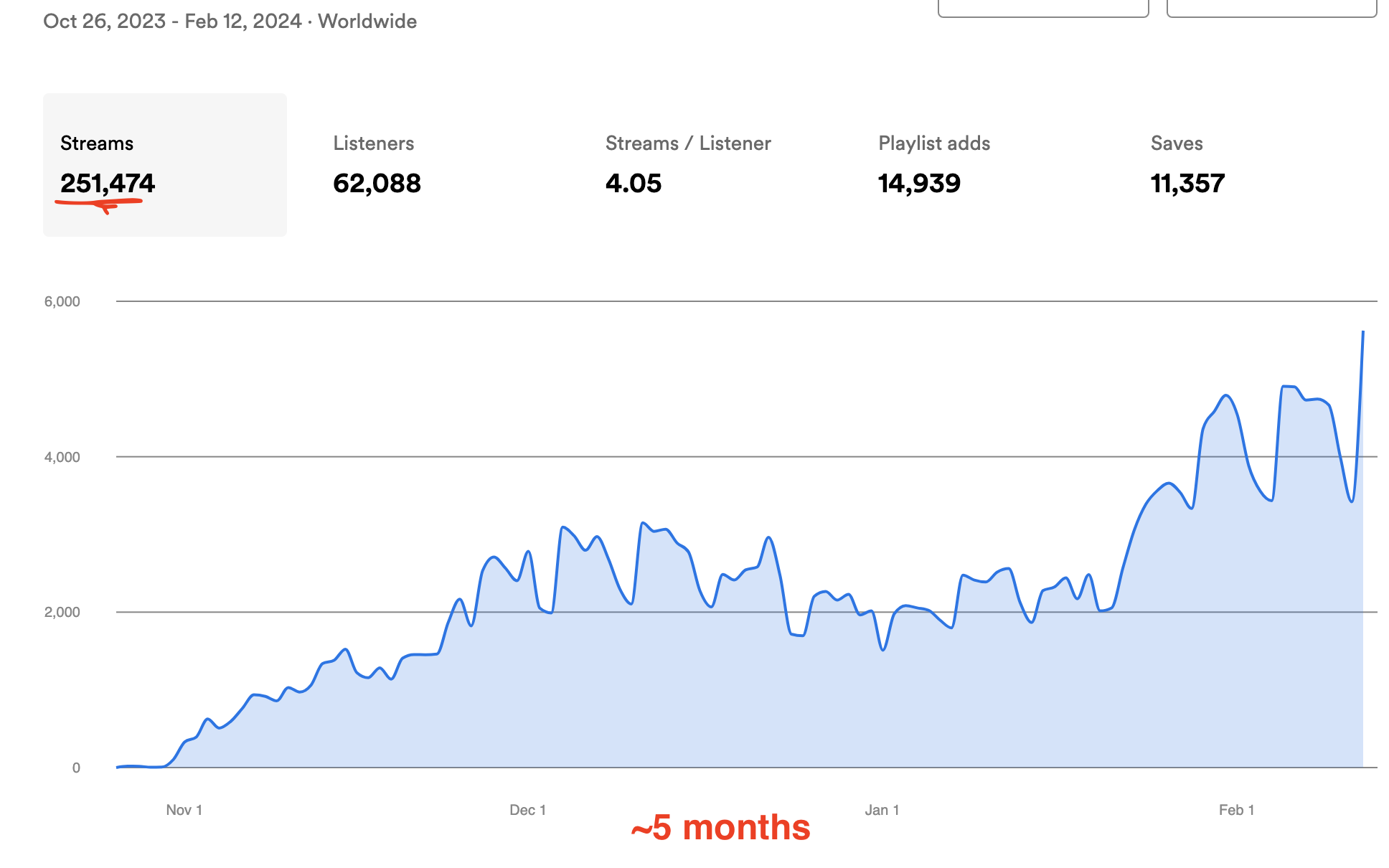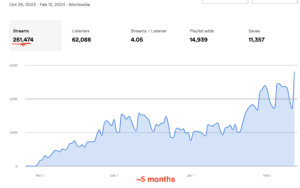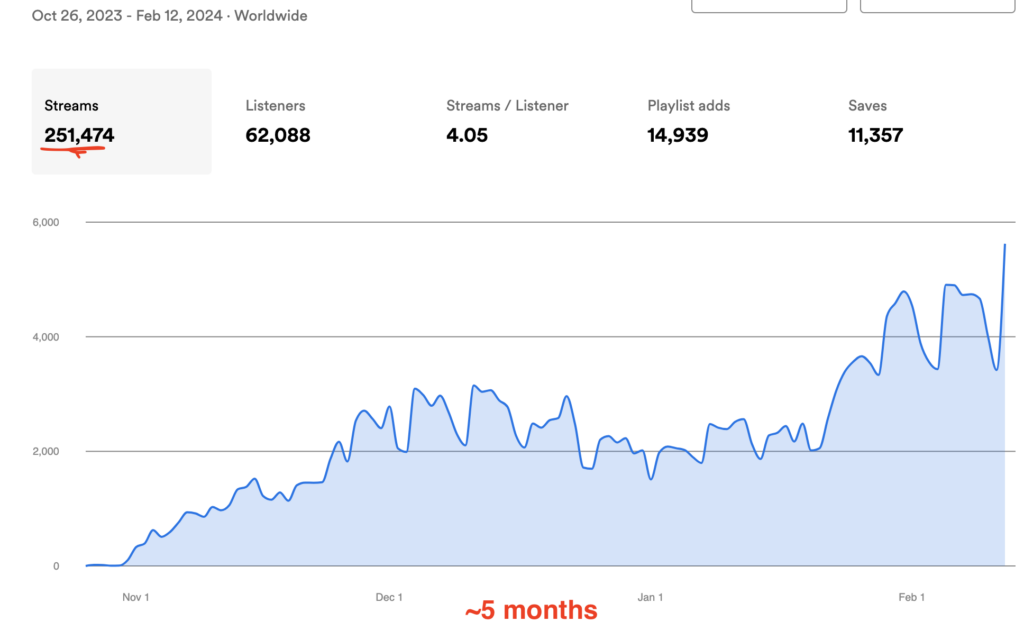Every year, we like to ask artists how they make money. What were the things that actually worked and led to an inflow of cash in their bank accounts? In our most recent survey, we received 75 responses from musicians that Jon broke down on the YouTube channel. He detailed what musicians do to make money and how much they make doing it.
Now, I’ve seen quite a few articles and YouTube videos at the start of the year talking about how to become a millionaire. The beginning of the year is the time for thinking big, dusting off your aspirations, and going for it.
If that’s the type of thing you’re looking for, this is not that type of article.
I finally made it around to watching The Wire, thanks to a global pandemic that gave me some free time. One of the characters on the show is a guy named Proposition Joe. He describes business as a “buy for a dollar, sell for two” type of game. That’s all we’re trying to do here. What are a few simple steps you can take to put an extra dollar in your pocket every now and then.
Of course, I’m not against making millions of dollars from music. That sounds great, to be honest. But whether it’s buying new equipment, studio time, or production costs, it’s easy for your bills from music to pile up. Balancing the pulls between the artistic and business sides can be one of the most difficult challenges for independent artists. These small, practical ideas can help you grow your career while your art is hopefully growing as well.
While these tips may not necessarily be the blueprint to becoming a millionaire, having a hobby or artistic pursuit that makes you money instead of costing you money is excellent, too.
Everyone needs a starting point. If you’ve never made money as a musician, this could be the year you join the ranks. Assuming the experience of trying to make some money this way doesn’t break you; maybe your goals grow to trying to make a full time living as an indie artist.
As the often-quoted line from Chinese philosopher Lao Tzu goes, “The journey of a thousand miles starts with a single step.” If that sounds like something you’re interested in, here are ten ways to make money as a musician in 2024.
1. Play Live Shows
Playing live shows is one of the most obvious ways to make money. Out of our 75 survey responses, this was the number one answer musicians gave on how they made money last year. This was how most musicians made money last year and how musicians who responded to our survey made money the latest year.
It’s the easiest and best path to seeing some compensation for your musical talents.
While it can be challenging to land your first live gig, there are likely more local venues looking for live music than you would first anticipate.
If you’re interested in pursuing this path, do whatever you can to learn more about the local music scene in your area. Learn what restaurants have music going during dinner service. Learn which local events could use new artists. Learn which venues are more willing to take a shot on unknown acts. Depending on your scene, there may be fewer opportunities and more competition for those gigs than other areas. Either way, it will be helpful to get a lay of the land to give you more direction on which opportunities will lead to the most success.
Next, brush up on your networking skills. Do you have any friends or connections that can help you get a foot in the door somewhere? Are there open mic nights where you can meet other artists who might be looking for openers? It’s been said before, but it’s true: who you know can be much more powerful than what you know.
Finally, consider the power of house shows when it comes to live performances.
You don’t need to sit around and hope for someone else to give you a break. Host a show at your own place, ask a friend to host, or put the call out on social media to see who would be interested in having a show at their place. It might not be the same thrill as selling out a venue, but it’s a great way to keep overhead costs low and you can build a grassroots momentum that can lead to larger venues.
2. Start a Patreon
These next two ideas come from monetizing your fanbase and giving your biggest fans a chance to support you.
Whether you’ve been able to build up a decent following on social media or you’ve only been sharing your music with friends and family, you need to give people an avenue to support the work you’re doing.
One way to do that is by starting a patreon.
Bring people behind the scenes of what your process looks like. Share songs you’re working on, even if you only have fragments. Could you provide them with exclusive merch? Offer to do live QAs? There are a number of ways you can brainstorm creative ideas to provide value to your patrons, but the reality is, at least in the beginning, your subscribers are genuinely there to support your work.
Giving them a platform to do so will feel good for them and can encourage you to keep making things.
3. Sell Merch

This goes hand in hand with the last idea, but it’s important to have physical products people can buy to support you. Make a t-shirt, a vinyl version of your album, a poster, etc.
I remember buying a CD at a friend’s show and that coming up clutch on a remote drive across Montana when I couldn’t stream music through my car and the radio options weren’t cutting it for me. I also remember buying a deep-v t-shirt of another friend’s band. I don’t wear it out in public, but getting to support them was worth way more to me than the $20 I spent at the time.
If you start selling a lot of merch or begin to increase your fans, start experimenting with merch bundles where you can mix and match two or three items together and sell them at a higher price point.
The point is, people love something they can put their hands on.
4. Sync Licensing
If you want to make money from music, it helps to realize that live shows and streaming revenue are not the only ways to do it.
As the streaming wars wage on and original content continues its meteoric rise, a seemingly never-ending supply of new movies, TV shows, and video games are looking for music to improve their storytelling.
Selling your songs for placement in these mediums is called sync licensing.
It’s just as difficult and competitive to land sync placements as making money anywhere else in the music industry, so it’s not a golden bullet. However, if this is your first time considering it, this niche could be a viable fit for your music.
To explore this route, you’ll most likely find success working with an agent who is familiar with the space and has connections in place instead of trying to navigate this unfamiliar terrain yourself.
5. Music Composition for Podcasts
Another avenue you can explore is writing a theme song or custom composition for podcasters.
You could probably do this one on your own without an agency or management. The paycheck will be modest, but it’s a growing industry that provides another compelling market for your skills and talents.
According to this article from Backlinko that did a deep dive on podcast stats in 2023, podcast listenership is continuing to see close to double-digit growth. When it comes to money in the podcasting game, here’s an impressive stat:
- “Podcasting became a billion-dollar industry in 2021, and in 2023, podcasting revenue is expected to reach $2.3 billion in the US alone.”
- “In 2024, it’s estimated that podcasting ad revenue will hit the $4 billion mark.”
Ultimately, more people are creating podcasts and generating revenue from them. This stat doesn’t even account for the number of visual podcasts happening on YouTube.
Putting together original music for these creators could be a profitable avenue to break into.
6. Music Composition for Live Performances
On the opposite hand of the digital creators, several live performances can also use music composition or live accompaniment.
From dance recitals, to fashion shows, to book readings and corporate events, many situations call for the services of a talented musician. Several opportunities exist to make inroads with performers who can use help with the musical aspects of their events.
Whether you choose to become the go-to person for a specific type of performance or find it easier to leverage your existing network and take more of a jack-of-all-trades approach, the live performance space shouldn’t be overlooked.
Also, weddings, try to do anything you can with weddings. The national average couples spent on weddings in 2023 was $29k, so there’s a little money floating around out there for those you could try to get in on.
7. Music Consulting for Indie Artists
If you’re just starting out, you can skip to the next idea, but if you’ve been around the block a few times, you can turn your hard-earned life lessons into valuable instruction for others who want to follow a similar path.
Anyone who has spent time trying to make money in the music world has a list of successes and failures that can be helpful signposts to those coming up behind you.
Especially if you have an area of expertise or a unique perspective, you can find fulfillment and monetary compensation in helping others in their journey.
8. Personalized Music Messages
You can offer up your services to create a personalized music message. Similar to the concept of Cameo, but you don’t need to be famous or on an official platform.
If you have a website, you can let people know you’re willing to create a custom birthday, anniversary, special occasion message for that special someone in their life.
I think these types of gifts are fun and thoughtful. Every time I’ve seen a friend receive one it’s been worth it.
9. Host an Open Mic Night
I love a good weekly tradition. I’m all about breakfast at a little hole-in-the-wall place on Saturday mornings or Thursday night trivia at the local brewery. The slow process of becoming a regular somewhere is an experience I genuinely enjoy.
When I was living in Virginia, I had a couple of friends who would regularly attend the Monday night open mic night at a local restaurant, and it was impossible not to fall in love with the eclectic cast of characters.
If you also enjoy that type of environment, see if there’s a local venue that an open mic night could make sense for and convince them to let you host it.
Another option is if you have the equipment to make your own.
I had a friend set up a monthly event in his backyard over the summers.
Whether you go the DIY route or collaborate with a venue, it’s a great way to make a few dollars and surround yourself with a community of artists who inspire you to work on your own craft.
10. Work at Local Venue
As you approach your music more like a business this year, one option is to get more involved on the business side.
Landing a job at a venue you think is well-run can be an incredible way to learn about the industry while making money, even in a part-time capacity, on nights and weekends. You can make vital connections in the industry and learn all about the different roles in a venue, from the booking agents to the promoters. While you may ultimately want to be up on stage, starting in the background can help you connect important dots that get you there.
Go Make Some Money
As promised, this article is a terrible way to make a million dollars this year.
I imagine you were also mentally crossing off items on this list as you read them. The goal isn’t for you to do all ten of these, nor are these the only ten ways to make money. As you might have noticed, I didn’t list streaming income because this isn’t intended to be a comprehensive article.
However, I hope there were one or two items that did catch your interest. Something in here where your response was, I think I could try that.
I don’t blame you if you don’t want to play a gig for your 6-year-old niece’s dance recital. Lean into your strengths and go for the ones you are most excited about. Getting started is the hardest part. It’s easier to build once you’re moving.
Wherever you’re at in your path, I hope you make some money this year and let us know all about it in our next survey!









